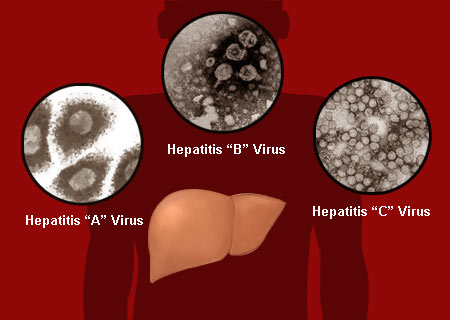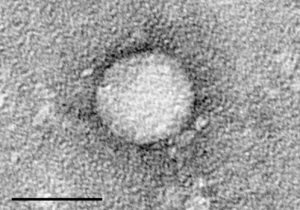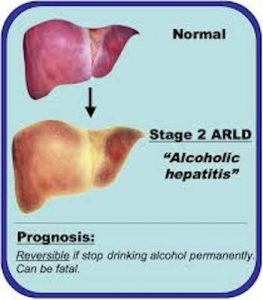
What is Hepatitis?
What is Hepatitis?
Hepatitis refers to an inflammation of the liver cells and damage to the liver. There are different types and causes, but the symptoms can be similar.
The liver's functions include detoxifying the blood, storing vitamins, and producing hormones. Hepatitis can disrupt these processes and create severe health problems throughout the body.
At least five viruses can cause hepatitis. The three most common are hepatitis viruses A, B and C. Infection with any of these three can be fatal.
Other types of hepatitis can result from overconsumption of alcohol or an autoimmune condition. This article will look at hepatitis A, B, and C. These are forms of hepatitis transmitted by a virus.
In the United States, the incidence of hepatitis A has been falling for the last 20 years, but acute hepatitis C has seen an increase of 44 percent between 2011 and 2012.
Types
Hepatitis has several different types, but the symptoms of each are similar. Hepatitis can take acute and chronic forms.
The three main types of hepatitis are known as hepatitis A, B, and C. Each is caused by a different virus. All three types can be acute, lasting for 6 months or less, and types B and C can be chronic, lasting for longer.
Each type has different characteristics and is transmitted in different ways, but symptoms tend to be similar.
Hepatitis A
In the United States (U.S.), 1,390 cases of hepatitis A were reported in 2015.
It is often mild, and most people make a full recovery, after which they are immune and therefore protected from the virus in the future. However, if it progresses, symptoms can be severe or life-threatening.
People in parts of the world with poor sanitation are particularly at risk of contracting HAV.
There are safe and effective vaccines that protect against this virus.
Hepatitis B
Hepatitis B can be transmitted when a person:
has unprotected sexual intercourse with an infected person
shares a needle with an infected person, often for illegal drug or steroid use
has a tattoo created with unsterilized needles
is accidentally pricked, for example, health workers dealing with sharp objects
shares personal items, such as a toothbrush or razor, with an infected person
is bitten by someone who is infected
An infected mother can pass the virus on to her infant when breast-feeding.
The liver of a person infected with hepatitis B swells. Severe damage can result.
HBV infection can become chronic. This can lead to complications, including scarring of the liver, or cirrhosis. It can also cause a type of cancer known as hepatocellular carcinoma.
In 2015, 887,000 deaths worldwide were linked to HBV, mostly as a result of complications such as these.
In the U.S., there were 3,370 reported cases of HBV, but the Centers for Disease Control and Prevention (CDC) estimate that the real figure may be around 21,900.
There is not currently a cure for HBV. However, the incidence rate has dropped in countries where the vaccine is available, and this vaccine is 95 percent effective against the infection.
There is a safe and effective vaccine that can protect against HBV.
Hepatitis C
HCV can lead to liver damage and swelling. Around 1 in 4 people with HCV get cirrhosis, and this can lead to liver cancer.
Donated blood is now tested for HCV, but people who received organ transplants or blood donations before testing became part of the donation process may be at risk.
Other at-risk groups include healthcare workers who are exposed to sharps, users of intravenous drugs, and infants born to mothers with HCV.
The number of cases of HCV in the U.S. rose nearly threefold between 2010 and 2015 when 2,436 cases were reported. However, the CDC estimate that 33,900 infections occurred in 2015, including those not reported.There is no vaccine to prevent HCV, but treatment can cure it.
Treatment
Some types and cases of hepatitis can heal without intervention, but sometimes it can progress to scarring of the liver, or cirrhosis.
Hepatitis A
There is no specific treatment for HAV. The doctor will advise the patient to abstain from alcohol and drugs during the recovery. Most patients with hepatitis A will recover without intervention.
Hepatitis B
A patient with HBV needs to rest and abstain completely from alcohol. The doctor may prescribe an antiviral agent called interferon, or other antiviral suppressive therapies.
Hepatitis C
A patient with hepatitis C will be prescribed antiviral agents, with or without ribavirin.
Some directed antivirals and combination therapies are now available to treat the hepatitis C virus based on its subtype. These treatments target viral replication and prevent the virus from being able to reproduce. When taken correctly, the cure rate is very high.
These medications can be expensive, and insurers may have specific criteria for treatment.
Symptoms
Many people with hepatitis experience either mild or no symptoms. When symptoms appear, they can do so from 15 to 180 days after infection. This applies to all types of hepatitis.
Acute hepatitis
The initial phase of hepatitis is called the acute phase. The symptoms are similar to mild flu, and may include:
diarrhea
fatigue
loss of appetite
mild fever
muscle or joint aches
nausea
slight abdominal pain
vomiting
weight loss
jaundice
The acute phase is not usually dangerous, but in certain people, it can result in acute liver failure and death. It may also progress to a chronic infection. This is most likely with HBV or HCV.
As the disease progresses, chronic hepatitis can lead to progressive liver failure, resulting in jaundice, swelling of the lower extremities, confusion, and blood in the feces or vomit.
The following may occur:
dark urine
hives
itchy skin
light-colored feces
yellow skin, whites of the eyes, and tongue
Patient outcomes after the acute phase depend on various factors, especially the type of hepatitis. Some people will not know they have chronic hepatitis until liver failure occurs.
Diagnosis
As the symptoms of the different types of hepatitis are similar, the type and severity of hepatitis may only be diagnosed through laboratory tests.
A doctor will perform a physical examination and ask for a medical history to assess whether a patient has been exposed to a likely cause of hepatitis.
If a patient recently traveled abroad, they may have HAV. If they have had unprotected sex, they may have HBV.
If hepatitis is suspected, the following tests can confirm a diagnosis:
Blood tests: These can detect whether the body is producing antibodies to fight the disease, and they can assess liver function by checking the levels of certain liver proteins and enzymes.
Nucleic acid tests: For hepatitis B and C, an HBV DNA or HCV RNA test can confirm the speed at which the virus is reproducing in the liver, and this will show how active the disease is.
A liver biopsy: This can measure the extent of liver damage and the possibility of cancer.
Paracentesis: Abdominal fluid is extracted and tested, to identify the cause of fluid accumulation.
Elastography: This measures the liver's stiffness by emitting sound waves.
Surrogate markers: A type of blood test to assess the development of cirrhosis and fibrosis.
Treatment will depend on the diagnosis.
Causes
The three most common types of viral hepatitis are all caused by viral infections.
Hepatitis A is caused by consuming food or water infected with the hepatitis A virus (HAV), often while traveling abroad. The virus can also be transmitted through anal-oral contact during sex or by injecting drugs.
Hepatitis B is caused by the hepatitis B virus (HBV) and is spread through contact with infected blood, semen, and some other body fluids. It can be a sexually transmitted disease (STD).
Hepatitis C mostly results from percutaneous infection, occurring when the HCV virus gets under the skin. It is usually spread through injected narcotics, needle-stick injuries, and a lack of infection control in healthcare settings.
HCV cannot be caught from contact with feces, and sexual transmission is less common than in other types.
Alcohol, medicines, obesity, and chemical exposure do not cause types A, B, or C, but they may aggravate inflammation and make symptoms worse.
Prevention
Hepatitis can be dangerous and difficult to treat, so people are advised to take precautions against possible infection.
Preventing hepatitis A
Hepatitis A is mostly spread through infected food and water.
The following steps can help avoid infection, especially when traveling.
Wash hands with soap after using the bathroom.
Only consume food that has just been cooked.
Only drink commercially bottled water, or boiled water if you're unsure of local sanitation.
Only eat peelable fruits if you are in a location with unreliable sanitation
Only eat raw vegetables if you are sure they have been cleaned or disinfected thoroughly.
Get a vaccine for HAV before traveling to places where hepatitis may be endemic.
Preventing hepatitis B
To minimize the risk of transmission:
Tell any sex partner if you are a carrier or try to find out if they carry the disease.
Practice safe sex using condoms.
Only use previously unused, clean needles.
Do not share toothbrushes, razors, or manicure instruments.
Only allow the use of well-sterilized skin perforating equipment, such as during a tattoo, piercing, or acupuncture.
Have the HBV vaccination if you are at risk.
How to prevent hepatitis C
As this is often passed on through the transfer of infected bodily fluids, the following steps can help prevent HCV transmission:
Do not share needles, toothbrushes, or manicure equipment.
Make sure equipment is well-sterilized for any skin piercing.
Consume alcohol with moderation.
Do not inject illegal drugs.
Hepatitis A and C are curable, but hepatitis B is only preventable by vaccine. A cure is still under development.
Outlook
The different types of hepatitis have different chances of recovery.
Hepatitis A: This type of hepatitis will normally resolve in 2 months without leaving any long-term effects. A person with HAV will usually be immune to hepatitis A for the rest of their life.
Hepatitis B: Most adults infected with the HBV virus recover within 90 days and achieve lifelong immunity. However, 90 percent of infants, 20 percent of older children, and 5 percent of adults will develop a chronic infection and develop severe health problems, such as liver cancer and cirrhosis.
Hepatitis C: This becomes a lifelong infection in 70 to 85 percent of people that have the HCV virus. Hepatitis C is fatal in between 1 and 5 percent of people. The infection can now be cured, and 15 to 25 percent of people with HCV clear the infection without treatment.
Related Posts
Hope, love and new treatment help overcome Hepatitis C
Hope, love and new treatment help overcome Hepatitis C Barry Morrow diagnosed with disease in 2005 CLARKSVILLE, TENN. — In the United States today, there are approximately 3.2 million citizens living with Hepatitis C, a contagious liver disease spread through blood contact. Many victims remain unaware that they carry this “silent killer,” which can remain…
Low uptake of HCV treatment in England will lead to substantial disease burden by 2035
Low uptake of HCV treatment in England will lead to substantial disease burden by 2035 Michael Carter Published: 13 June 2014 Only 3% of patients with chronic hepatitis C virus (HCV) are treated for their infection each year in England, according to research published in the Journal of Hepatology. The current uptake of treatment was…
Understanding the strains of hepatitis
Understanding the strains of hepatitis by Cedric Ricks Enlarge Electron micrographs of hepatitis C virus purified from cell culture. Scale bar is 50 nanometers. Credit: Center for the Study of Hepatitis C, The Rockefeller University. Hepatitis C is a very sneaky creature that coats itself in an envelope which changes every time the body tries…
Observing National Hepatitis Testing Day
Observing National Hepatitis Testing Day Dr. Ronald Valdiserri Next Monday, May 19th, is the third national Hepatitis Testing Day, established to raise greater awareness of an epidemic that is too often unrecognized. Millions Living with Undiagnosed Infections There are approximately 3.5–5.3 million Americans living with chronic viral hepatitis, but most of them do not know…
Medicare Eases Restrictions On Pricey Hepatitis C Treatment
Medicare Eases Restrictions On Pricey Hepatitis C Treatment By Richard Knox Alexandra Olgin for NPR This policy change would pay for treatment with a combination of new, expensive drugs for patients who haven’t responded to older treatment regimens and are approaching or have cirrhosis of the liver. Friday, May 16, 2014 Federal Medicare officials are…
The cure for hepatitis C is upon us
The cure for hepatitis C is upon us, but at a costly penny ANDRÉ PICARD (Corrected version) The Globe and Mail Published Sunday, Apr. 27 2014, 4:00 PM EDT Last updated Sunday, Apr. 27 2014, 10:33 PM EDT There is a revolution coming to the treatment of hepatitis C. But a big fat asterisk is…
Liver Care After Successful Hepatitis C Treatment
Liver Care After Successful Hepatitis C Treatment March 19, 2014 Being cured of Hepatitis C is an exciting and more frequent occurrence thanks to improvements in antiviral therapy; however, caring for your liver afterwards is important for the liver’s longevity. By Nicole Cutler L.Ac. One of your most precious internal organs, the liver takes a…
Living With Auto-Immune Heptatitis
Living With Auto-Immune Heptatitis Comments (0) Out of the blue, Marina Barlow developed a yellow hue to her skin – jaundice – and found herself in the Bristol Royal Infirmary for a week where doctors diagnosed auto-immune hepatitis, for which there is no cure. So Marina, who is 29 and lives in Filton, is stuck with…
New Drug Combo Cures Toughest Cases of Hepatitis C, Hints to Future Injection-Free Therapies
Hints to Future Injection-Free Therapies 5 hours ago0 Comments Posted in News, Hepatitis, Research Efforts to cure hepatitis C, the liver-damaging infectious disease that has for years killed more Americans than HIV/AIDS, are about to get simpler and more effective, according to new research at Johns Hopkins and elsewhere. In a study to be…
What is Alcoholic Hepatitis
Alcoholic hepatitis Definition Definition Alcoholic hepatitis describes liver inflammation caused by drinking alcohol. Though alcoholic hepatitis is most likely to occur in people who drink heavily over many years, the relationship between drinking and alcoholic hepatitis is complex. Not all heavy drinkers develop alcoholic hepatitis, and the disease can occur in people who drink only…









